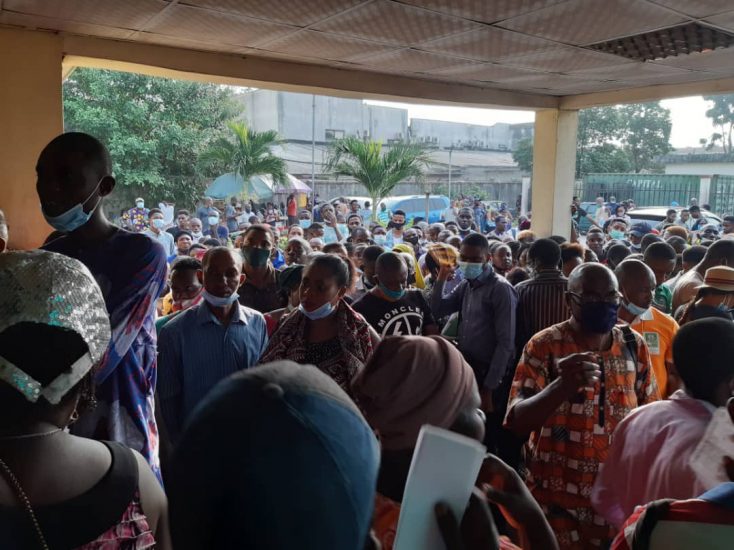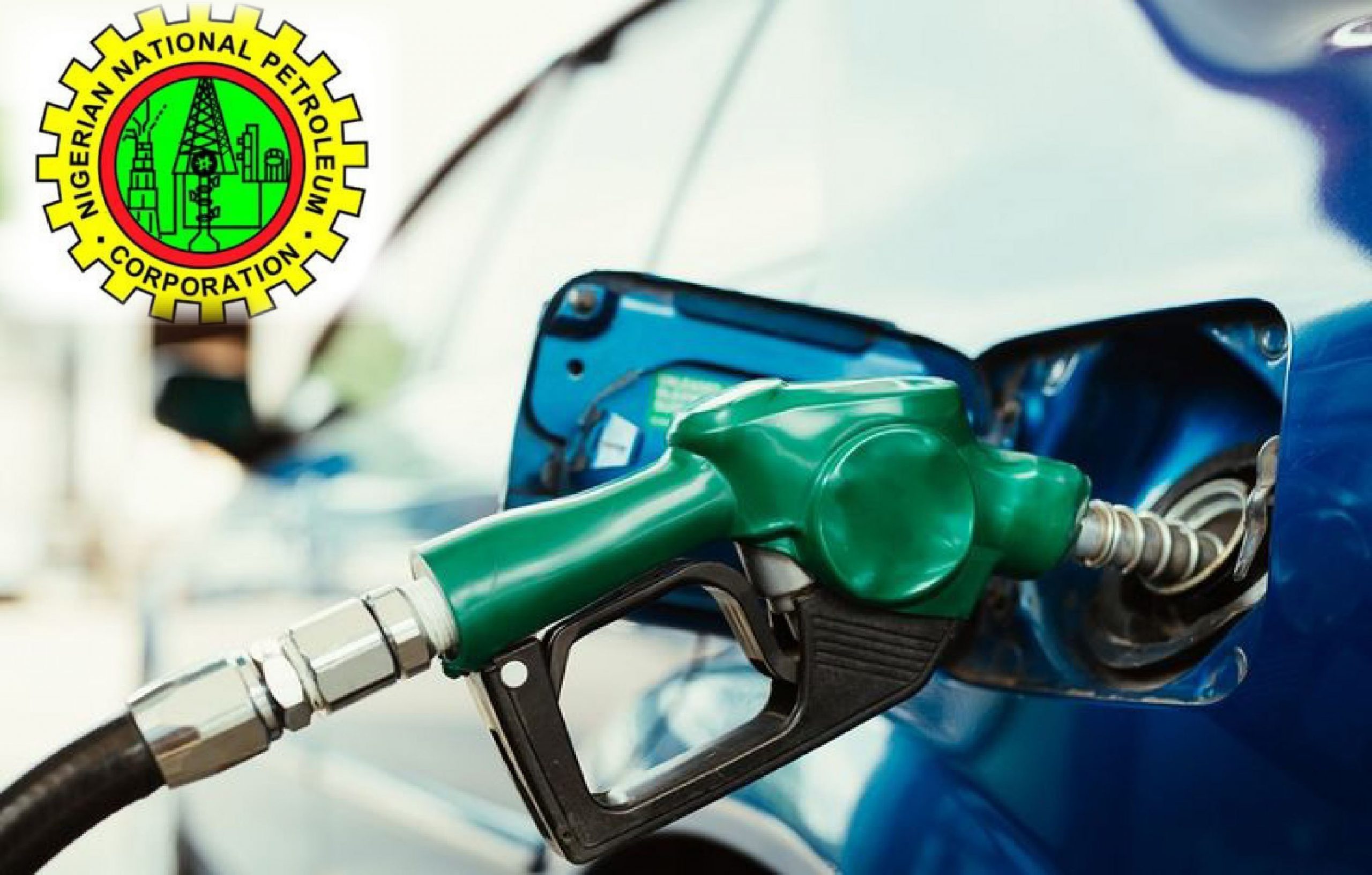Business
FG suspends Lagos NIN registration over crowd

The Federal Government may have suspended the National Identity Number registration process in Lagos office of the National Identity Management Commission.
This followed the motley crowd that thronged the office of the NIMC on Monday morning, which prompted the management to shut down the office.
A source at the headquarters of the commission said the decision to put the process on hold in Lagos was because of the embarrassing crowd that came for the NIN enrolment on the first day.
The source added that the fear of COVID-19 spread played a big role in halting the [rocess in Lagos until further notice.
Hundreds of people who visited the NIMC office at Ikeja lamented that they could not be attended to.
They accused the commission of wasting their time as a result of lack of good management.
One fellow claimed to have got to the place as early at 6am said he met over 400 people already in the queue.
PREMIUM TIMES also reported an 85-year-old man, Fatai Akinbile, who was at the NIMC office to correct his date of birth, as expressing how bitter he felt with the entire process.
“I came from Ajah, left the house very early. The issue is they wrote 1953 as my date of birth instead of 1935. I have made attempts to correct it and they referred me to Ikeja,” he said
Akinbile, who claimed he did not understand the announcement that SIM cards would be blocked, said he had been on the process for long and was really fed up.
“I have someone here that offered to help me but when I got here this morning, they say we cannot enter and they are not working,” he said.
Many people said the commission shut down abruptly after distributing forms to some of them.
“They chased everybody saying if we don’t go away, they will call the police. Of a truth, the police arrived shortly,” another person who declined giving his name said.
PREMIUM TIMES said it’s reporter saw police vehicles and some police officers at the entrance of NIMC office with the commission’s doors shut and no official present.
The Federal Government had announced last week that subscribers to all networks in the country are mandated to provide their NIN, else, they would be blocked from using their SIM cards.
The government gave two weeks deadline, after which SIM cards without NIN will be blocked.
Communicating the directive, the spokesperson for the NIMC said the major telephone networks must require all their subscribers to provide their NIN.
“The submission of NIN by subscribers to take place within two weeks (from today December 16, 2020 and end by 30 December, 2020).
“After the deadline, ALL SIMs without NINs are to be blocked from the networks.
“A Ministerial Task Force comprising the Minister and all the CEOs (among others) as members is to monitor compliance by all networks. Violations of this directive will be met by stiff sanctions, including the possibility of withdrawal of operating License,” the statement said.
Despite the short notice and outrage by Nigerians, the government said there would be no extension of the deadline.
In a bid to prevent their SIM cards from being blocked, hundreds of Lagos residents on Monday stormed the NIMC office at Alausa, Ikeja.
The office, which opened officially at 8am, had numerous people waiting at the gate as early as 5am to be registered.
The commission’s office was subsequently shut down and many of the enrollees dispersed.
Business
Nigeria’s gas production increases by 15.6% to 227,931.65 mscf

Nigeria’s gas production increases by 15.6% to 227,931.65 mscf
Nigeria’s gas output has increased 15,6 percent month-on-month, MoM, to 227,931.65 million standard cubic feet, mscf, in March 2025.
But on year-on-year, YoY basis, the nation’s gas output recorded a marginal increase to 227,931.65 mscf in March 2025, from 198,353.62 mscf, recorded in the corresponding period of 2024.
Data obtained from the Nigerian Upstream Petroleum Regulatory Commission, NUPRC, Gas Production Status reports indicated that of the total of 227,931.65 mscf produced in March 2025, 119,552.75 mscf was associated while 108,378.90 mscf was non-associated gas.
Associated gas is extracted in the process of producing crude oil while non-associated gas is produced without crude oil after much investment, exploration and development.
The Ministry of Petroleum Resources (Gas), which is directly involved in the development of policies, targeted at increasing investment in the sector said efforts have been made to increase investment and production of gas in Nigeria.
Similarly, in its recent report obtained by Vanguard, the Nigerian LNG Limited stated: “We are fully committed to expanding our operations with the NLNG Train 7 Project, which will boost our production capacity by 35%, increasing from 22 Million Tonnes Per Annum (mtpa) to 30 mtpa. This project underscores our role as a key player in the global LNG market and positions Nigeria as a top-tier supplier of LNG, leveraging its vast proven gas reserves of 202 trillion cubic feet (the 9th largest globally).
Vanguard
Business
Marketers count losses as NNPC slashes petrol price

Marketers count losses as NNPC slashes petrol price
Petroleum product marketers have expressed frustration over financial losses following the Nigerian National Petroleum Company Limited’s (NNPC) recent reduction in the pump price of Premium Motor Spirit (petrol).
On Easter Monday, NNPC retail outlets across major cities adjusted their pump prices, with Lagos stations dropping from N925 to N880 per litre, while Abuja saw a similar drop to N880. In Kano, the price was revised from N950 to N935 per litre.
The unexpected price cut comes just days after the Dangote Refinery reduced its ex-depot price from N865 to N835 per litre—further intensifying pricing pressure on independent marketers who had stocked up at previous, higher rates.
The $20bn refinery also directed its partners like MRS, Heyden, and Ardova to sell a litre of petrol at the rate of N890 instead of N920 in Lagos, N900 in the South West, N910 in the South-South, and N920 in the North East.
READ ALSO:
- Insecurity: Presidency questions push for state police, accuses govs of not doing much
- Wike’s team warns Falana against ‘misleading his clients’
- Rivers: Fubara’s supporters praise Tinubu’s intervention with emergency rule
This newspaper observes that the new NNPC prices in Kano, Abuja, Port Harcourt and Lagos are N10-N15 lower than that of the Dangote refinery, signalling another price war between the two companies.
Our correspondent reports that some NNPC filling stations are still selling at the old rate. But marketers said these stations were given the liberty to exhaust old stock before adjusting to the new prices.
In an interview with our correspondent, the National Vice President of the Independent Marketers Association of Nigeria, Hammed Fashola, confirmed the price reduction, stressing that filling station operators were losing money.
He told our correspondent that NNPC Retail sent a memo to its outlets to effect the new prices.
“It is confirmed that NNPC has reduced PMS prices. It is now N880 per litre in Lagos. They sent messages to their retail outlets. Some of them have already put the price at N880. However, they allow those having old stock to continue selling at the old rate. Some are still selling at N910.
“Those are the ones that still have their old stock. So, the same thing applies to independent marketers. Those that have their old stock are still trying to see how they can dispense it,” he stated.
While acknowledging that the fluctuation in fuel prices is one part of deregulation, Fashola declared that marketers are losing money.
“The price reduction is a welcome development, but at the same time, it has a negative impact on the side of the marketers. We are losing money. That’s just the truth. We are losing money. That’s the bitter truth,” he said.
READ ALSO:
- UK records over 22,000 asylum-seeking Nigerians
- Driver crushes one-year old boy to death in Ekiti
- Bring your children to compete with mine, MC Oluomo challenges those mocking his spoken English
According to him, the price cuts are good for the masses, but marketers pay the price.
“On the side of the masses, Nigerians are better for it. People are getting cheaper fuel now, which is good. That’s the beauty of deregulation that we are talking about. There’s nothing anybody can do about it. But marketers are the ones bearing the losses, seriously.
Asked if there is any way to reduce the losses, he replied, “On the part of marketers, what we can do is just to try as much as possible to try and sell. We will reduce prices to a level that, at least, our losses will not be too much. So, you will be able to get rid of your old stock before you go to the market to buy at the new rate and start selling at the new rate.
On whether the petrol price could drop to N800 or N700 soon, Fashola refused to make projections.
“I don’t want to predict that. You know, two major factors determine this – the crude oil price and our exchange rate. So, I don’t want to predict the price. All these things have their implications. If the crude oil comes down to something like $50 per barrel, it has its own implications for our economy. It will affect the government revenue. At the same time, inflation and all that are also there. So, I don’t want to predict that,” he stated.
Recall that the Dangote refinery resumed price cuts after the Federal Government directed that the naira-for-crude deal should continue indefinitely.
Marketers count losses as NNPC slashes petrol price
(Punch)
Business
Nigerian banks generated N14tn from loans – Report

Nigerian banks generated N14tn from loans – Report
Nine leading Nigerian banks raked in a staggering combined interest income of N14.26 trillion in 2024, reflecting a sharp increase in borrowing costs for businesses, especially manufacturers.
According to an analysis of the audited financial results filed with the Nigerian Exchange Limited, the banks First Holdco, Guaranty Trust Holding Company, Zenith Bank Plc, United Bank for Africa, FCMB Group, Fidelity Bank, Stanbic IBTC Holdings, Access Holdings, and Wema Bank recorded a 119.55% surge in interest income compared to N6.49 trillion in 2023.
While these financial institutions reported massive earnings from interest on customer loans, manufacturers bore the brunt of the high cost of borrowing. Reports show that the manufacturing sector incurred a total of N1.3 trillion in loan-related expenses during the same period, further tightening the grip of financial pressure on Nigeria’s struggling industrial base.
According to the Corporate Finance Institute, interest income is the amount paid to an entity for lending its money or letting another entity (individual or corporate) use its funds.
Commercial banks, in their financial intermediary roles, provide funding for the productive sectors of the economy.
A breakdown of the results of the nine banks showed that Access Holdings grew its interest income by 98.69 per cent to N3.11tn from N1.56tn in the previous year.
Zenith Bank’s interest income rose by 137.74 per cent to N2.72tn. First HoldCo, the parent company of FirstBank, saw its interest income increase by 155 per cent to close at N2.39tn.
Also appreciated by more than 100 per cent were the interest incomes to United Bank for Africa, N2.37tn (120 per cent), Guaranty Trust Holding Company, N1.32tn (148 per cent), and Stanbic IBTC Holdings, N566bn (109 per cent).
The interest income of FCMB Group rose by 75.16 per cent to N621.81bn. That of Fidelity Bank rose by 85.03 per cent to N803.05bn, and Wema Bank’s interest income increased by 91.03 per cent to close the year at N354.63bn from N185.64bn.
The financial institution with the highest interest income in percentage terms was First HoldCo, followed by GTCO and Zenith Bank Plc.
In actual terms, Zenith Bank raked in the highest interest income of N1.58tn, followed by Access Holdings, which recorded a N1.54tn increase compared to last year, and First HoldCo with N1.46tn.
Meanwhile, some of the lenders indicated that the interest income was accrued on bad loans.
READ ALSO:
- How Nigerian hotelier died during wife’s 60th birthday celebration
- BREAKING: Tunde Onakoya breaks Guiness record for longest chess marathon
- Nigerian Uber driver shot dead on duty in US
For Zenith Bank, impaired financial assets amount to N18.25bn and N18.25bn (2023: N29.09bn and N5.48bn) for Group and Bank, respectively.
UBA said, “Interest income includes accrued interest on impaired loans of N4.26bn for the Group (Bank: N3.98bn) for the year ended 31 December 2024 and N4.64bn for the Group (Bank: N2.70bn) for the year ended 31 December 2023.”
Fidelity Bank indicated that its interest income on bad loans amounted to N8.10bn (2023: N6.19bn).
This revenue boost for the financial sector came on the back of sustained hikes in the Monetary Policy Rate by the Monetary Policy Committee of the Central Bank of Nigeria.
By the end of 2024, the MPC had increased the MPR by 875 basis points, pushing the benchmark rate from 18.75 per cent in 2023 to 27.50 per cent. A major argument for the MPC’s decision to hike rates was inflation.
The committee emphasised commitment to price stability as the bedrock of a thriving Nigeria, which necessitates substantial monetary tightening as headline inflation rose to 34.80 per cent as of December 2024.
On a year-on-year basis, the headline inflation rate was 5.87 per cent higher than the rate recorded in December 2023 (28.92 per cent).
This shows that the Headline inflation rate (year-on-year basis) increased in December 2024 compared to the same month in the preceding year (i.e., December 2023).
While the banks raked in trillions of naira from interest incomes, the real sector is not happy with the situation as funding costs climb.
Speaking at the recent Bankers Committee Town Hall, which the CBN organised in collaboration with the Bankers Committee in Lagos, the President of the Manufacturers Association of Nigeria, Francis Meshioye, decried the high cost of funding for businesses.
He said, “Manufacturers spent about N1.3tn on interest rate; the cost of funds last year, 2024, and that is huge. Next is the cost of energy, which was about N1.2tn. It’s between 30 and 35 per cent for the cost of funding and 30-40 per cent for the cost of energy.
“The fund that we use to pay for power is charged at around 35 per cent. We are paying 35 per cent for funds to pay for power. Some are even paying 37 per cent. How do you survive this?
“These two are very important things to address to be sure that we become competitive. Have we thought of getting long-term funding for manufacturers or businesses? We need to think outside the box.”
READ ALSO:
- Troops foil another violent clash in Plateau
- SERAP sues Tinubu govt over ban on Eedris song ‘Tell Your Papa’
- NDLEA intercepts cocaine in Saudi-bound religious books
Meshioye urged the banks to tone down their drive for profit, stressing that the high interest rates were stifling manufacturers.
“It’s very clear that if we want to achieve anything meaningful, we must look at infrastructure, particularly power. We have the power to do so many things. We just need the will and do not always aim to make overly ambitious profits. If you kill the place you make the money from, then how will you survive?” he challenged the banks.
As the banks rake in trillions of naira, experts warned that Nigeria’s spiralling interest rates, now well above 20 per cent, are worsening poverty and crippling access to credit for small-scale entrepreneurs and farmers, further threatening the fragile economy.
The CBN has been adopting an aggressive monetary tightening, with the Monetary Policy Rate around 24.75 per cent, making commercial lending rates range between 28 per cent and 35 per cent. The high rates have made it nearly impossible for most businesses and individuals in the productive sectors to access affordable financing.
Financial analysts had argued that while the central bank aims to curb inflation, the unintended consequence has been a severe credit crunch in sectors critical to employment and economic growth.
They noted that small and medium enterprises, which make up the backbone of Nigeria’s economy, were being squeezed out of the credit market, and farmers were increasingly unable to fund the next planting season.
At the same time, commercial banks are thriving. With risk-free government securities and high-interest lending, banks are posting record profits, while investment in the real economy, including agriculture, manufacturing, and small-scale industries, continues to collapse.
According to the National Bureau of Statistics, over 133 million Nigerians are living in multidimensional poverty. Rising borrowing costs are making it harder for individuals and businesses to access funds for investment, expansion, or even basic survival.
A senior analyst at Financial Derivatives Company, Tunde Ajayi, recently said the imbalance reflects a serious distortion in Nigeria’s financial architecture, one that prioritises the profitability of banks over the health of the real economy.
According to Ajayi, commercial banks are making windfall profits by investing heavily in risk-free government securities and offering loans at exorbitant interest rates to a few large borrowers, while critical sectors such as manufacturing, agriculture, and small and medium enterprises are being financially strangled.
“This model is unsustainable. What we have is a system where banks are incentivised to lend to the government or big corporations at high yields, while millions of small businesses and farmers are left without access to the capital they need to grow,” he mentioned.
He further warned that the long-term implications are dangerous, as it undermine economic diversification, domestic production, and employment generation.
Ajayi stressed that without affordable credit, the real sector responsible for creating jobs and driving inclusive growth will continue to shrink, further widening the gap between the rich and the poor.
Also, an agricultural finance consultant, Ngozi Uko, warned that the situation is even more dire for rural farmers.
“Access to credit for smallholder farmers has virtually dried up. We are seeing a drop in agricultural productivity, which is directly linked to the rise in food prices. Food inflation is now at over 35 per cent, and it’s pushing more Nigerians into hunger,” Uko said.
Nigerian banks generated N14tn from loans – Report
(Punch)
-

 International2 days ago
International2 days agoBreaking: Pope Francis dies at 88 – Vatican
-

 metro1 day ago
metro1 day agoBring your children to compete with mine, MC Oluomo challenges those mocking his spoken English
-

 metro3 days ago
metro3 days agoHow Nigerian hotelier died during wife’s 60th birthday celebration
-

 metro24 hours ago
metro24 hours agoRivers: Tinubu meets with Fubara, may lift his suspension
-

 News2 days ago
News2 days agoTinubu returns to Nigeria after France, UK trip
-

 metro2 days ago
metro2 days agoAnsar-Ud-Deen Society of Nigeria elects new leaders, Tinubu praises educational contributions
-

 Business1 day ago
Business1 day agoMarketers count losses as NNPC slashes petrol price
-

 metro2 days ago
metro2 days agoReno Omokri defends Tinubu’s appointments, blasts president’s critics






You must be logged in to post a comment Login